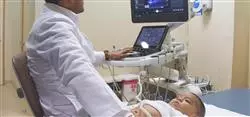University certificate
The world's largest faculty of medicine”
Introduction to the Program
Thanks to this Professional master’s degree, you will achieve a broad renewal of knowledge of Pediatric Cardiology and Congenital Heart Disease"
Sometimes heart disease can go unnoticed, being detected in adulthood. However, progress in the field of cardiology has made it possible to detect anomalies even when the fetus is still developing. This Professional master’s degree in Diagnosis and Treatment in Pediatric Cardiology and Congenital Heart Disease provides medical professionals with an update of their knowledge over 12 months.
A program consisting of audiovisual material in which the latest technology applied to educational teaching has been used. In this way, through video summaries, detailed videos or interactive diagrams, the professional will learn about recent advances in pediatric cardiology, progress in the diagnosis of pulmonary hypertension, non-invasive cardiac imaging, functional tests, fetal cardiology or heart disease, cardiomyopathies and tumors. The teaching resources are complemented by case study simulations, which will provide students with situations that are close to the reality they may experience in their daily clinical practice.
A 100% online university education, which allows to renew knowledge in a dynamic and agile way. TECH Global University also includes in all its programs the Relearning system, based on the reiteration of content, facilitates progress in the course of this degree in a much more natural way, reducing even the long hours of study so frequent in other methodologies.
An excellent opportunity for the medical professionals who wish to recycle their knowledge in a comfortable teaching format. Students only need a computer, tablet or cell phone with an internet connection to access the syllabus available on the virtual platform at any time. Without attendance or fixed schedules, this Professional master’s degree offers the opportunity to distribute the teaching load according to the needs of the students, facilitating the compatibility of professional responsibilities with quality education.
The clinical case studies provided by the teaching team will be very useful in updating your knowledge”
This Professional master’s degree in Diagnosis and Treatment in Pediatric Cardiology and Congenital Heart Disease contains the most complete and up-to-date scientific program on the market. The most important features include:
- Development of clinical cases presented by experts in Pediatric Cardiology and Congenital Heart Disease
- The graphic, schematic, and practical contents with which they are created provide scientific and practical information on the disciplines that are essential for professional practice
- Diagnostic-therapeutic new developments on assessment, diagnosis and treatment in Pediatric Cardiology and Congenital Heart Disease
- Contains practical exercises where the self-evaluation process can be carried out to improve learning
- Iconography of clinical and diagnostic imaging tests
- An algorithm-based interactive learning system for decision-making in the clinical situations presented throughout the course
- With special emphasis on evidence-based medicine and research methodologies in Pediatric Cardiology and Congenital Heart Disease
- All of this will be complemented by theoretical lessons, questions to the expert, debate forums on controversial topics, and individual reflection assignments
- Content that is accessible from any fixed or portable device with an Internet connection
A 100% online program that will allow you to keep abreast of progress in the field of intensive care of congenital heart disease”
The program includes, in its teaching staff, professionals from the sector who bring to this program the experience of their work, in addition to recognized specialists from prestigious reference societies and universities.
The multimedia content, developed with the latest educational technology, will provide the professional with situated and contextual learning, i.e., a simulated environment that will provide immersive training programmed to train in real situations.
This program is designed around Problem-Based Learning, whereby the professional must try to solve the different professional practice situations that arise throughout the program. For this purpose, the student will be assisted by an innovative interactive video system created by renowned and experienced experts.
View the contents of the media library whenever you want from your laptop"
Delve into the new imaging techniques in adolescent and adult congenital heart disease in this Professional master’s degree"
Why study at TECH?
TECH is the world’s largest online university. With an impressive catalog of more than 14,000 university programs available in 11 languages, it is positioned as a leader in employability, with a 99% job placement rate. In addition, it relies on an enormous faculty of more than 6,000 professors of the highest international renown.

Study at the world's largest online university and guarantee your professional success. The future starts at TECH”
The world’s best online university according to FORBES
The prestigious Forbes magazine, specialized in business and finance, has highlighted TECH as “the world's best online university” This is what they have recently stated in an article in their digital edition in which they echo the success story of this institution, “thanks to the academic offer it provides, the selection of its teaching staff, and an innovative learning method aimed at educating the professionals of the future”
A revolutionary study method, a cutting-edge faculty and a practical focus: the key to TECH's success.
The most complete study plans on the university scene
TECH offers the most complete study plans on the university scene, with syllabuses that cover fundamental concepts and, at the same time, the main scientific advances in their specific scientific areas. In addition, these programs are continuously being updated to guarantee students the academic vanguard and the most in-demand professional skills. In this way, the university's qualifications provide its graduates with a significant advantage to propel their careers to success.
TECH offers the most comprehensive and intensive study plans on the current university scene.
A world-class teaching staff
TECH's teaching staff is made up of more than 6,000 professors with the highest international recognition. Professors, researchers and top executives of multinational companies, including Isaiah Covington, performance coach of the Boston Celtics; Magda Romanska, principal investigator at Harvard MetaLAB; Ignacio Wistumba, chairman of the department of translational molecular pathology at MD Anderson Cancer Center; and D.W. Pine, creative director of TIME magazine, among others.
Internationally renowned experts, specialized in different branches of Health, Technology, Communication and Business, form part of the TECH faculty.
A unique learning method
TECH is the first university to use Relearning in all its programs. It is the best online learning methodology, accredited with international teaching quality certifications, provided by prestigious educational agencies. In addition, this disruptive educational model is complemented with the “Case Method”, thereby setting up a unique online teaching strategy. Innovative teaching resources are also implemented, including detailed videos, infographics and interactive summaries.
TECH combines Relearning and the Case Method in all its university programs to guarantee excellent theoretical and practical learning, studying whenever and wherever you want.
The world's largest online university
TECH is the world’s largest online university. We are the largest educational institution, with the best and widest online educational catalog, one hundred percent online and covering the vast majority of areas of knowledge. We offer a large selection of our own degrees and accredited online undergraduate and postgraduate degrees. In total, more than 14,000 university degrees, in eleven different languages, make us the largest educational largest in the world.
TECH has the world's most extensive catalog of academic and official programs, available in more than 11 languages.
Google Premier Partner
The American technology giant has awarded TECH the Google Google Premier Partner badge. This award, which is only available to 3% of the world's companies, highlights the efficient, flexible and tailored experience that this university provides to students. The recognition as a Google Premier Partner not only accredits the maximum rigor, performance and investment in TECH's digital infrastructures, but also places this university as one of the world's leading technology companies.
Google has positioned TECH in the top 3% of the world's most important technology companies by awarding it its Google Premier Partner badge.
The official online university of the NBA
TECH is the official online university of the NBA. Thanks to our agreement with the biggest league in basketball, we offer our students exclusive university programs, as well as a wide variety of educational resources focused on the business of the league and other areas of the sports industry. Each program is made up of a uniquely designed syllabus and features exceptional guest hosts: professionals with a distinguished sports background who will offer their expertise on the most relevant topics.
TECH has been selected by the NBA, the world's top basketball league, as its official online university.
The top-rated university by its students
Students have positioned TECH as the world's top-rated university on the main review websites, with a highest rating of 4.9 out of 5, obtained from more than 1,000 reviews. These results consolidate TECH as the benchmark university institution at an international level, reflecting the excellence and positive impact of its educational model.” reflecting the excellence and positive impact of its educational model.”
TECH is the world’s top-rated university by its students.
Leaders in employability
TECH has managed to become the leading university in employability. 99% of its students obtain jobs in the academic field they have studied, within one year of completing any of the university's programs. A similar number achieve immediate career enhancement. All this thanks to a study methodology that bases its effectiveness on the acquisition of practical skills, which are absolutely necessary for professional development.
99% of TECH graduates find a job within a year of completing their studies.
Professional Master's Degree in Diagnosis and Treatment in Pediatric Cardiology and Congenital Heart Disease
One of the most complex challenges faced by the obstetrician is to identify the existence of asymmetries and irregularities in the cardiac cavities or vessels of newborns. This is justified, since heart disease is one of the most common congenital malformations in neonates, being the second most frequent cause of death in them. Although most cases can be treated to be saved, a rigorous knowledge of the subject is required. That is why in TECH Global University we developed the Professional Master's Degree in Diagnosis and Treatment in Pediatric Cardiology and Congenital Heart Disease, a postgraduate program that will give a plus to the graduate's career so that they can develop with total confidence in one of the areas that has the greatest weight in prenatal and postpartum clinical intervention. Influencing the health of a newborn is a highly rewarding challenge for personal and professional development. Here at TECH, we offer the great opportunity to experience it with all the expertise that demands the quality of good practice.
Become an expert in pediatric cardiology
50% of neonates with congenital heart disease require early life-saving surgery, according to a report published by the Garrahan Pediatric Hospital in Argentina. The bottom of the matter lies in the need for more professionals versed in anamnesis and subsequent procedures to deal with such disorders. Within the educational field there are few offers to specialize in this aspect, because it is a very precise knowledge, acquired only in the internal practice of clinics and hospitals. That is why our program is a tool to change that paradigm, qualifying highly competitive experts from the ease and effectiveness of our online teaching methodology. We will teach students from fetal cardiology, to the various surgical and anesthetic techniques that must be available for the intensive care of congenital heart disease. They do not have to resort to extensive and cumbersome on-site postgraduate courses to enhance their curriculum, with TECH, they are just a click away from achieving the excellence and professional renown they are looking for.









